Learning Collaborative

Annually, the Institute for Public Health Practice, Research and Policy (IPHPRP) and the Iowa Department of Health and Human Services (HHS) host a learning collaborative on childhood lead poisoning prevention to advance lead poisoning prevention through collective impact. The purpose of this learning collaborative is to highlight programs and services throughout Iowa that have been successful in implementing strategies for preventing childhood lead poisoning. The goal is to bring together all partners that are working toward eliminating lead poisoning in Iowa. Use the buttons below to revisit our previous learning collaboratives.
2025 Learning Collaborative
On Tuesday, August 5, 2025 we hosted our fifth annual virtual learning collaborative on childhood lead poisoning prevention to advance childhood lead poisoning prevention through collective impact. The purpose of this event was to highlight programs and services throughout Iowa that have been successful in implementing strategies for addressing and preventing childhood lead poisoning. We brought together partners and sectors that are working toward eliminating lead poisoning in Iowa.
If you have any questions about the event, please contact Josie Hentzen at josie-hentzen@uiowa.edu.
Keynote Speaker:
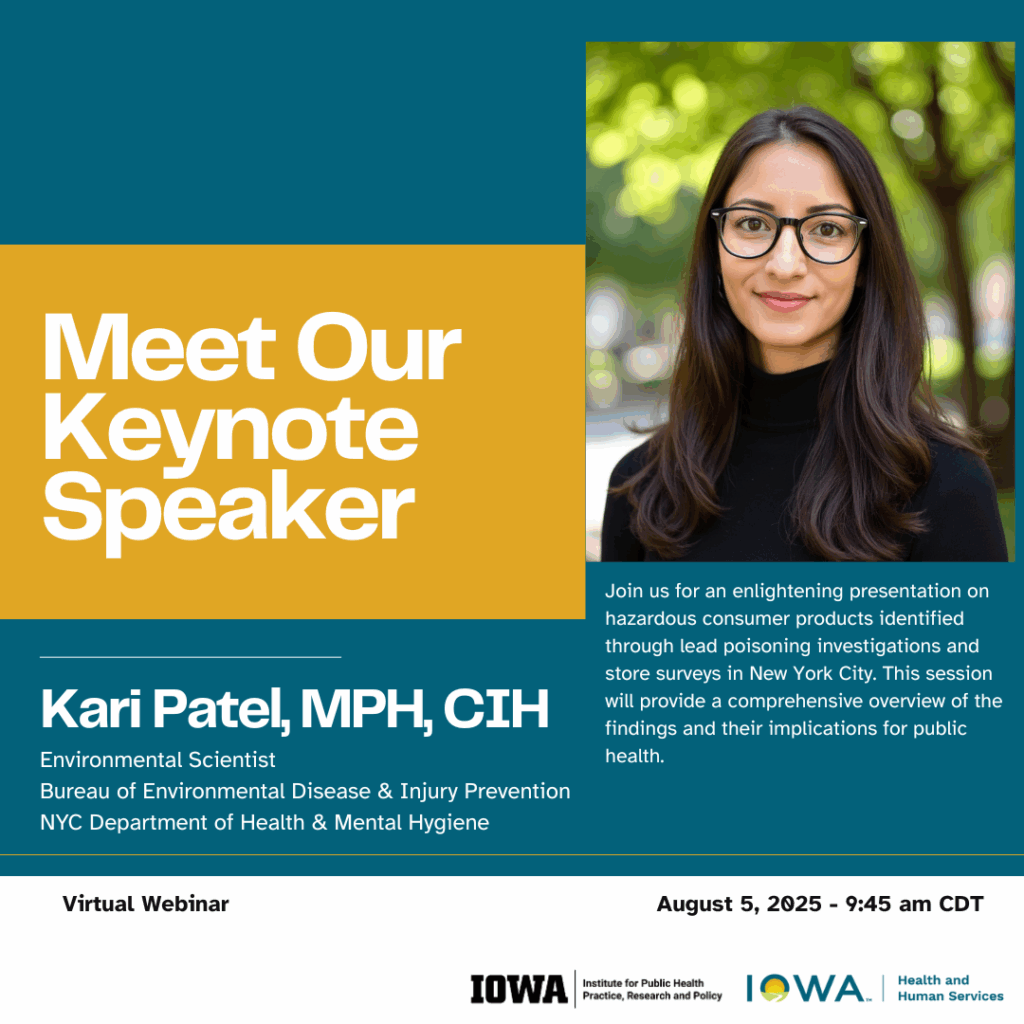
Title: Lead in Consumer Products: Insights from New York City Surveillance Data
Overview:
This was an enlightening presentation on hazardous consumer products identified through lead poisoning investigations and store surveys in New York City. The session provided a comprehensive overview of the findings and their implications for public health.
Speaker Bio:
Kari Patel, MPH, CIH
Kari Patel is an Environmental Scientist at the NYC Department of Health and Mental Hygiene. She specializes in investigating exposures to lead, mercury, arsenic, and cadmium. Kari conducts environmental sampling, develops risk communication strategies, and provides emergency response support during disease outbreaks. She is a board-certified industrial hygienist and holds an MPH from Columbia University’s Mailman School of Public Health.
Speaker Bios
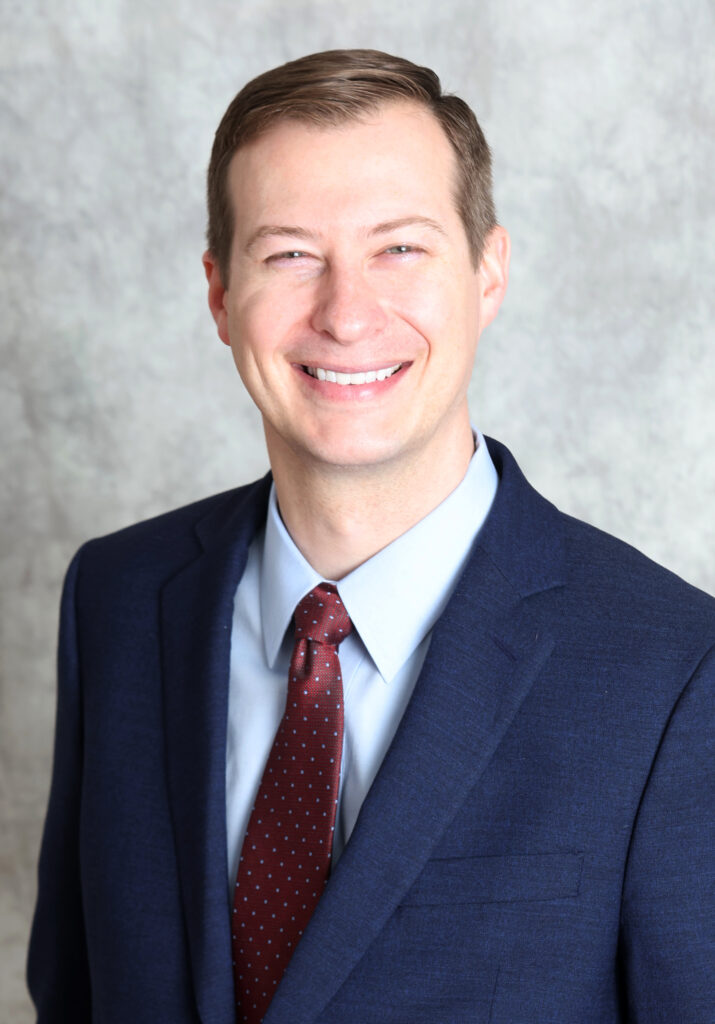
Robert Kruse, MD, MPH, FAAP
Robert Kruse serves as the State Medical Director and Division Director of Public Health. Prior to joining HHS, Dr. Kruse served as the Medical Director of Occupational Health at MercyOne in Des Moines. Dr. Kruse is board certified in Family Medicine and completed his residency training program at Rutgers University. He has a Master of Public Health with a concentration in Environmental and Occupational Health and is a Fellow of the American Academy of Family Physicians. He has held a teaching appointment as Assistant Professor at Rutgers University’s Robert Wood Johnson Medical School in the Department of Family Medicine and Community Health in Central New Jersey.
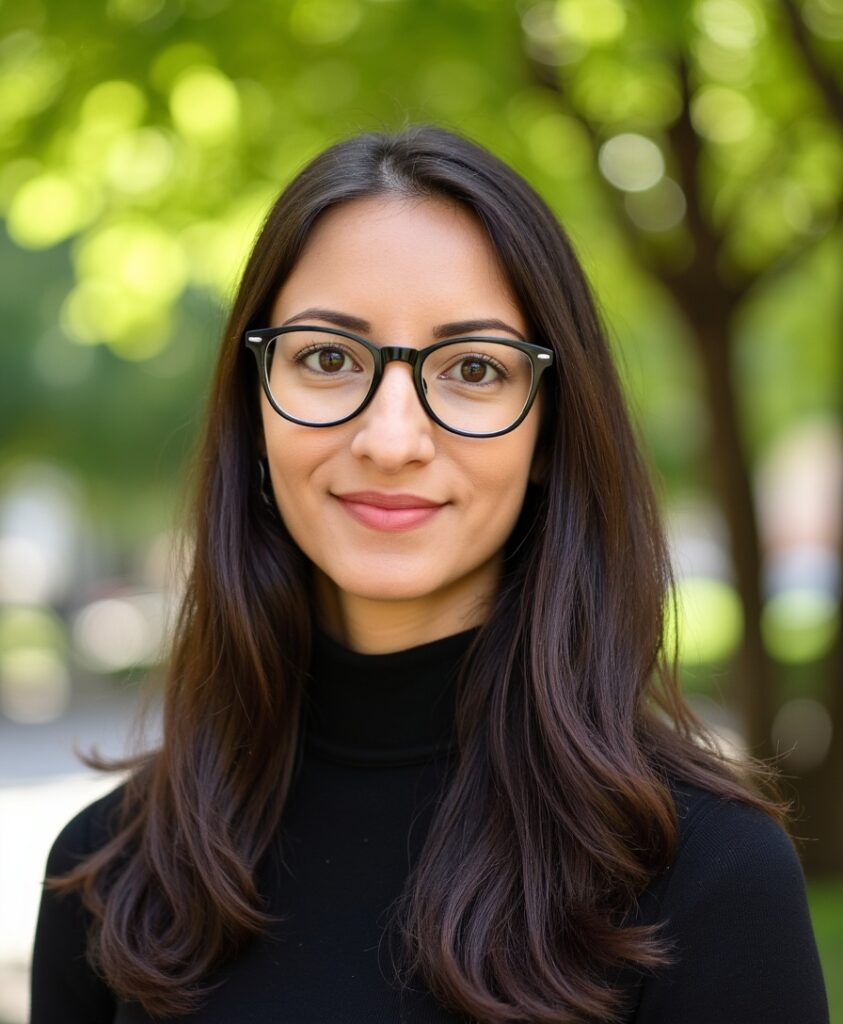
Kari Patel, MPH, CIH
Kari Patel is an Environmental Scientist at the NYC Department of Health and Mental Hygiene. She specializes in investigating exposures to lead, mercury, arsenic, and cadmium. Kari conducts environmental sampling, develops risk communication strategies, and provides emergency response support during disease outbreaks. She is a board-certified industrial hygienist and holds an MPH from Columbia University’s Mailman School of Public Health.
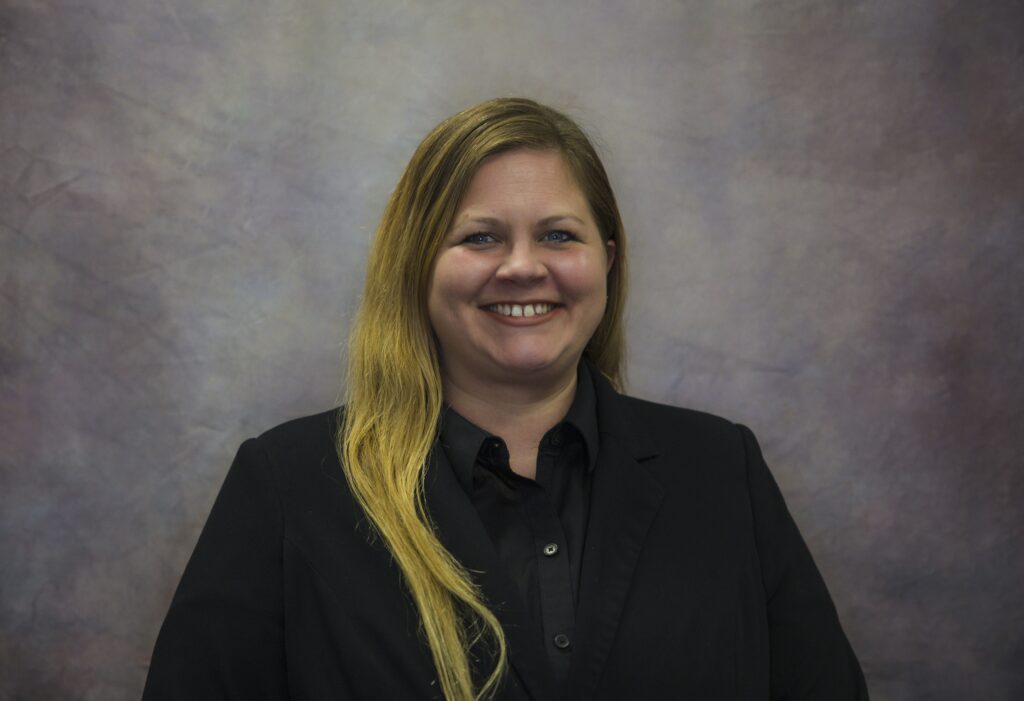
Amanda Beckett, MPH
Amanda Beckett is the Community Health Consultant for the Iowa HHS Childhood Lead Poisoning Prevention Program. A certified Elevated Blood Lead (EBL) inspector, she provides case management, environmental investigations, public education, and technical support to local partners. Amanda earned her MPH from Purdue in 2014 and began her public health career in planning services at the Iowa Department of Public Health. She has worked in the lead program for six years, serves on the Department’s Quality Improvement Council, and formerly served on the Wellness Committee. Amanda is committed to improving health outcomes through education, data-driven planning, and continuous quality improvement.
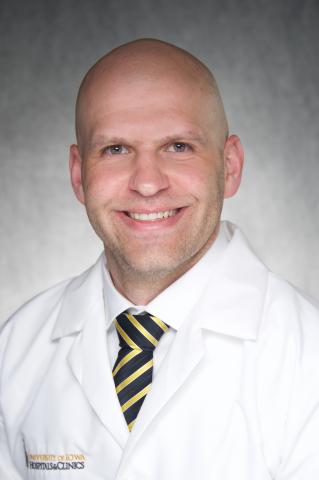
Dan McCabe, MD
Dr. Dan McCabe is a medical toxicologist and emergency medicine physician at the University of Iowa Hospitals & Clinics (UIHC), as well as a Clinical Associate Professor of Emergency Medicine at the University of Iowa, Director of the Division of Medical Toxicology at UIHC, and Medical Director for Iowa Poison Control Center. Dr. McCabe received his medical degree from the University of Iowa. He completed a residency in emergency medicine at Cook County Hospital and a fellowship in medical toxicology at the Regions Hospital/Minnesota Poison Control System. He is board certified in Emergency Medicine, Medical Toxicology, and Addiction Medicine. Dr. McCabe has a broad range of interests including improvement of care for the poisoned patient, toxicology, addiction medicine, resource utilization, and public health. patient, toxicology, addiction medicine, resource utilization, and public health.
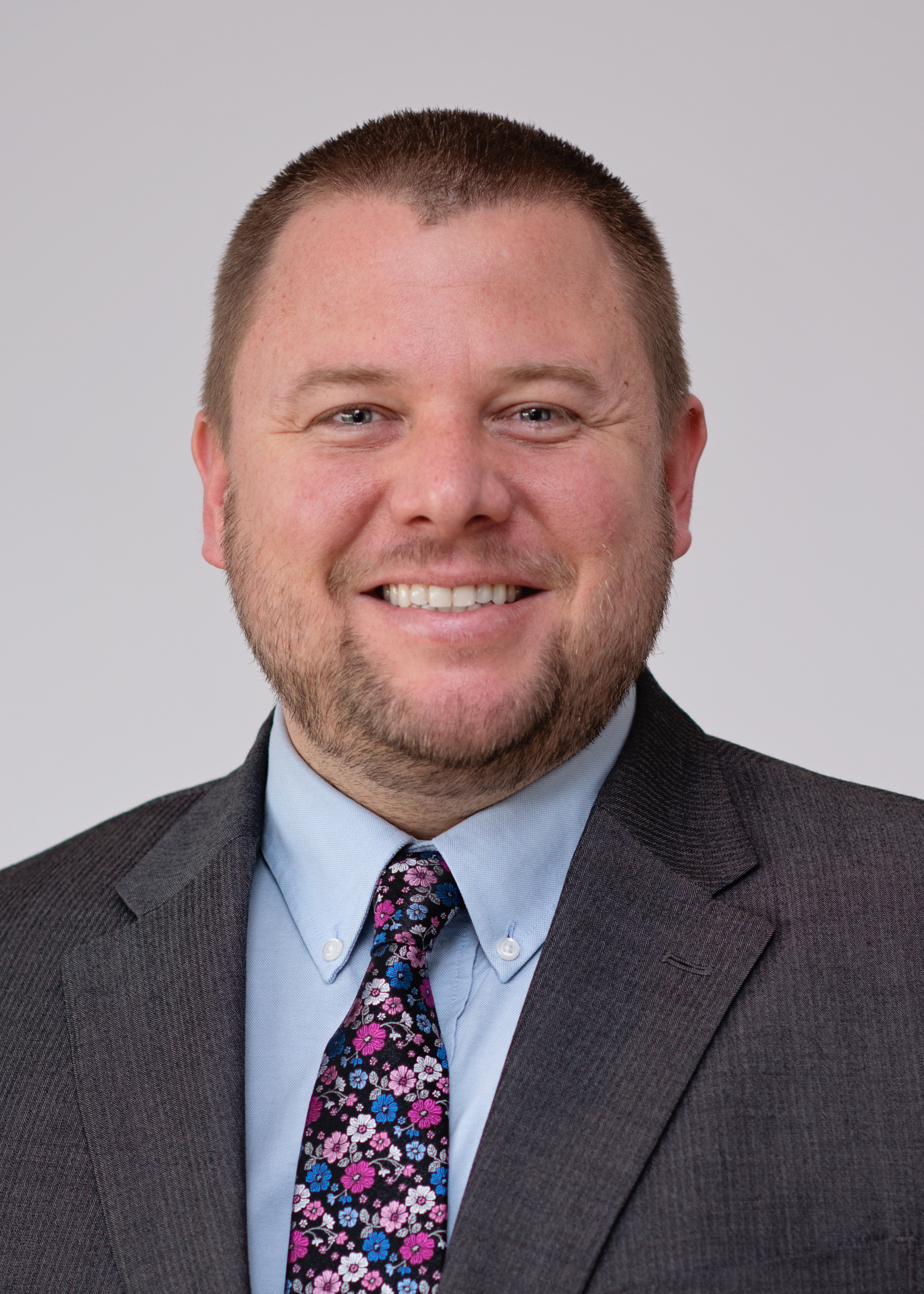
Grant Houselog, PharmD, CSPI
Grant Houselog is the Assistant Director of the Iowa Poison Control Center (IPCC). As a native and life-long Iowan, he earned his Doctor of Pharmacy degree from the University of Iowa College of Pharmacy in 2016 and immediately joined the IPCC team as a staff pharmacist. In 2018 he became a Certified Specialist in Poison Information and was promoted to his current position as Assistant Director in 2020.
Grant serves as the course director for all IPCC rotators and as the primary preceptor for pharmacy students from the University of Iowa, Drake University, South Dakota State University, and Creighton University on rotation at IPCC. He lectures annually at the University of Iowa and Drake University Colleges of Pharmacy; for both of which he has appointments as an Adjunct Assistant Professor. He has also served on many boards of national, state, and local organizations including several terms in executive roles. He currently serves as the Chair of the nation’s Government Affairs committee for America’s Poison Centers.
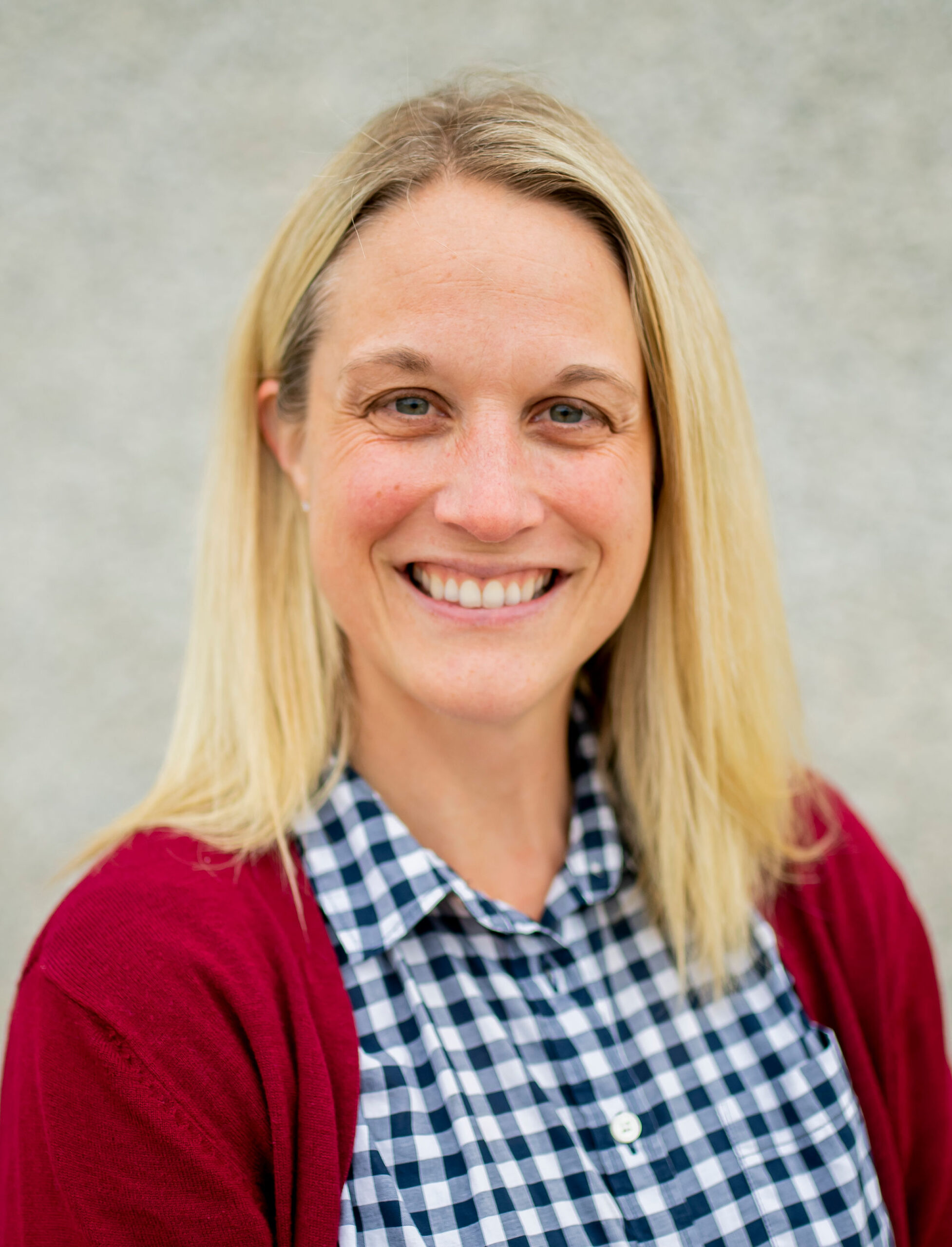
Alicia Sanders
Alicia Sanders, has been a dedicated public health professional since 2003, specializing in environmental health. As an Environmental Specialist, she conducts a wide range of inspections, including food safety, pools and spas, tattoo establishments, and elevated blood lead investigations. Alicia also serves as the coordinator for the Siouxland Healthy Homes Coalition, where she champions safe and healthy living environments.
Throughout her career, Alicia has witnessed and contributed to the evolving landscape of public health. She has collaborated with a diverse network of professionals across the Siouxland region and the state of Iowa. Passionate about community engagement, Alicia values strong partnerships with fellow agencies to educate and empower the public with vital health information.
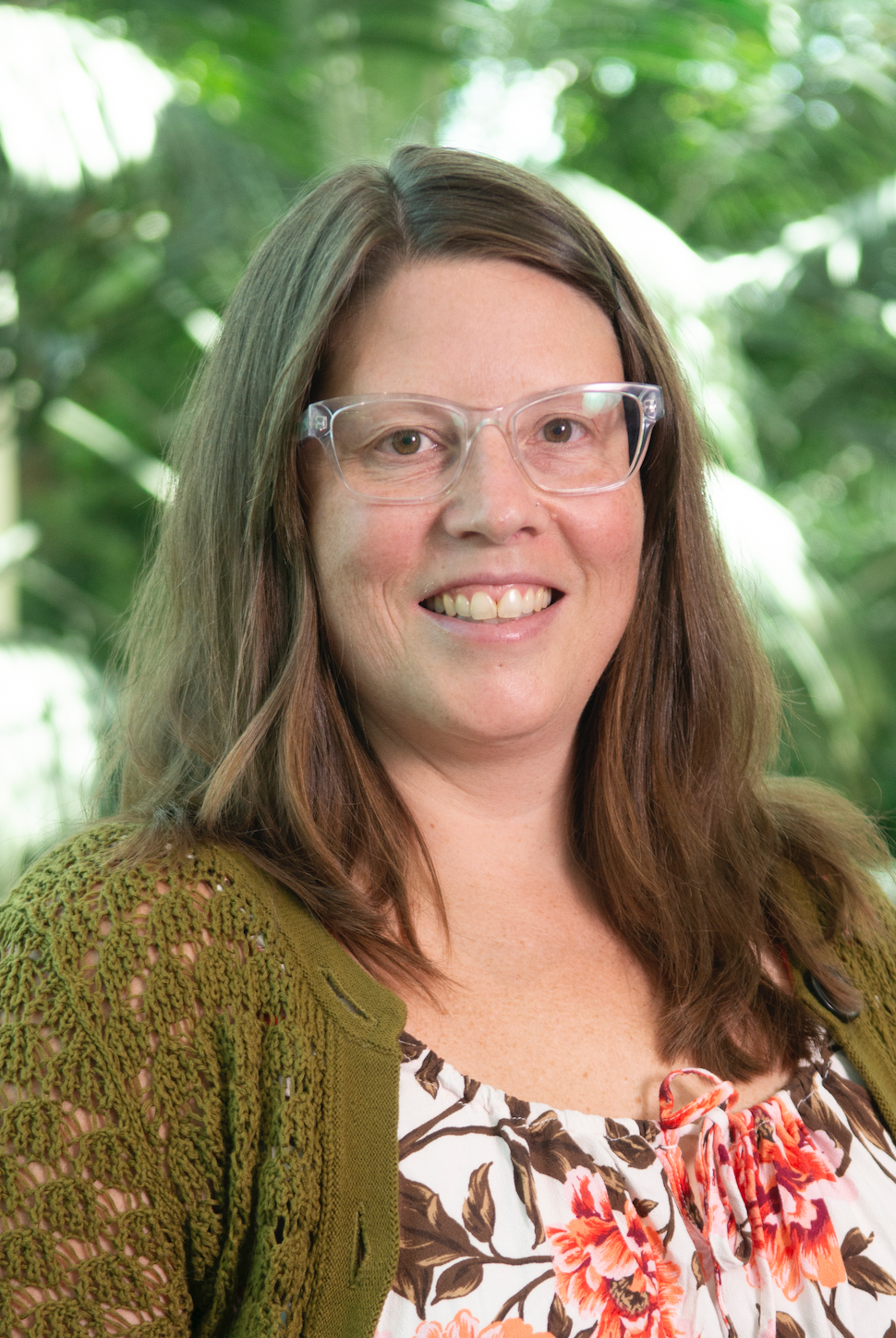
Heidi Cline
Heidi Cline serves as the Drinking Water Program Coordinator at the Iowa Department of Public Resources. Heidi leads a team of environmental engineers and environmental specialists tasked with implementing recent federal revisions to the Safe Drinking Water Act Lead & Copper rule at the state level and assisting Iowa’s public water supplies with rule compliance.
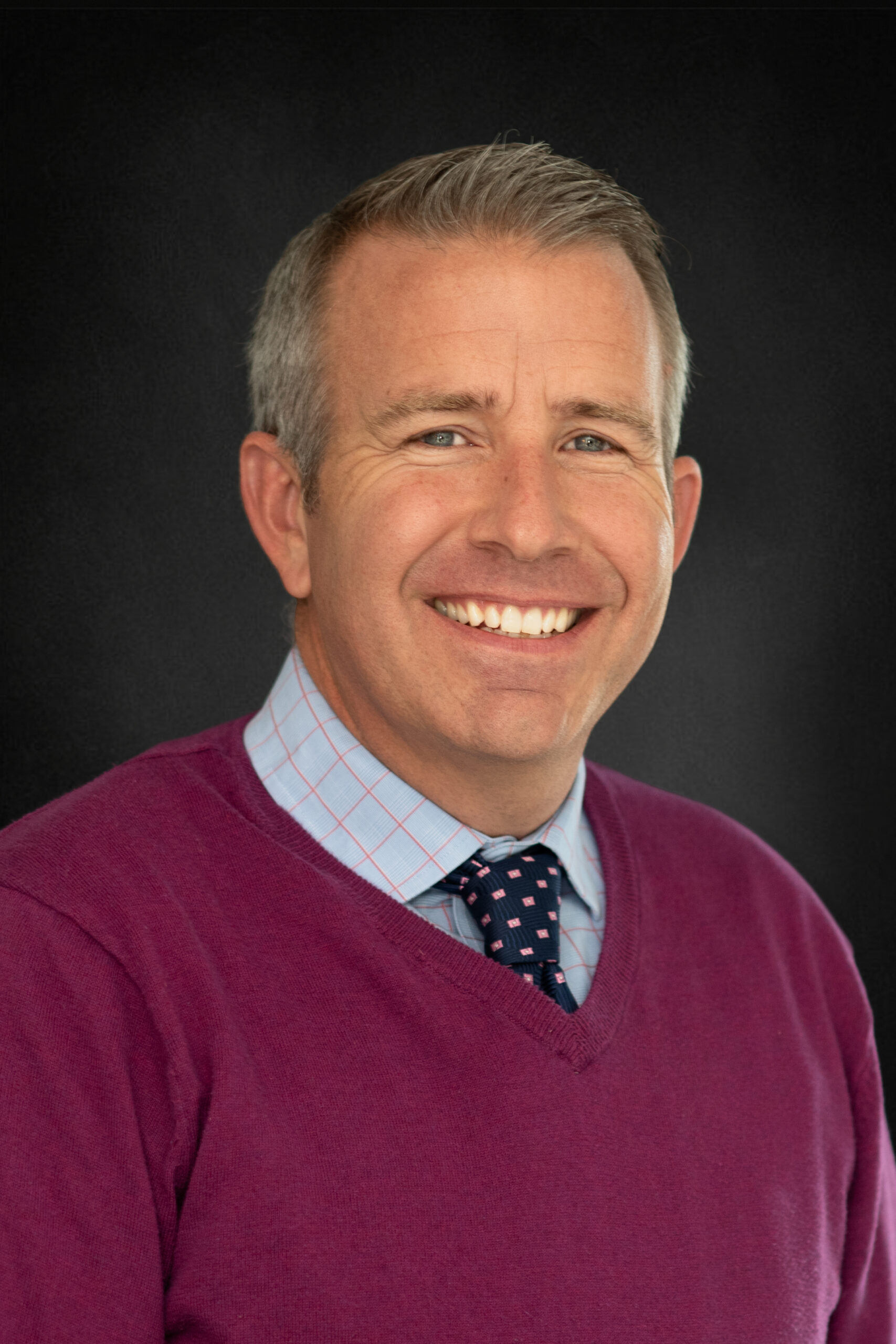
David Cwiertny, PhD
Dr. David Cwiertny is the William D. Ashton Professor in the Department of Civil and Environmental Engineering (CEE) and a Professor in the Department of Chemistry at the University of Iowa (UI). His research broadly focuses on water quality and water treatment, with particular interests at the intersection of public health and policy. At UI, he directs the State-funded Center for Health Effects of Environmental Contamination (CHEEC), which conducts research to identify, measure, and prevent adverse health outcomes from exposure to environmental contaminants. In 2016, he served as a Congressional Fellow for the American Association for the Advancement of Science (AAAS), working in the U.S. House of Representatives on the Committee for Energy and Commerce. He previously served as the founding Editor-in-Chief of Environmental Science: Water Research & Technology, a Royal Society journal. David holds a BS in Environmental Engineering Science and a minor in Chemistry from U.C. Berkeley (2000), and a PhD in Environmental Engineering from Johns Hopkins University (2006).
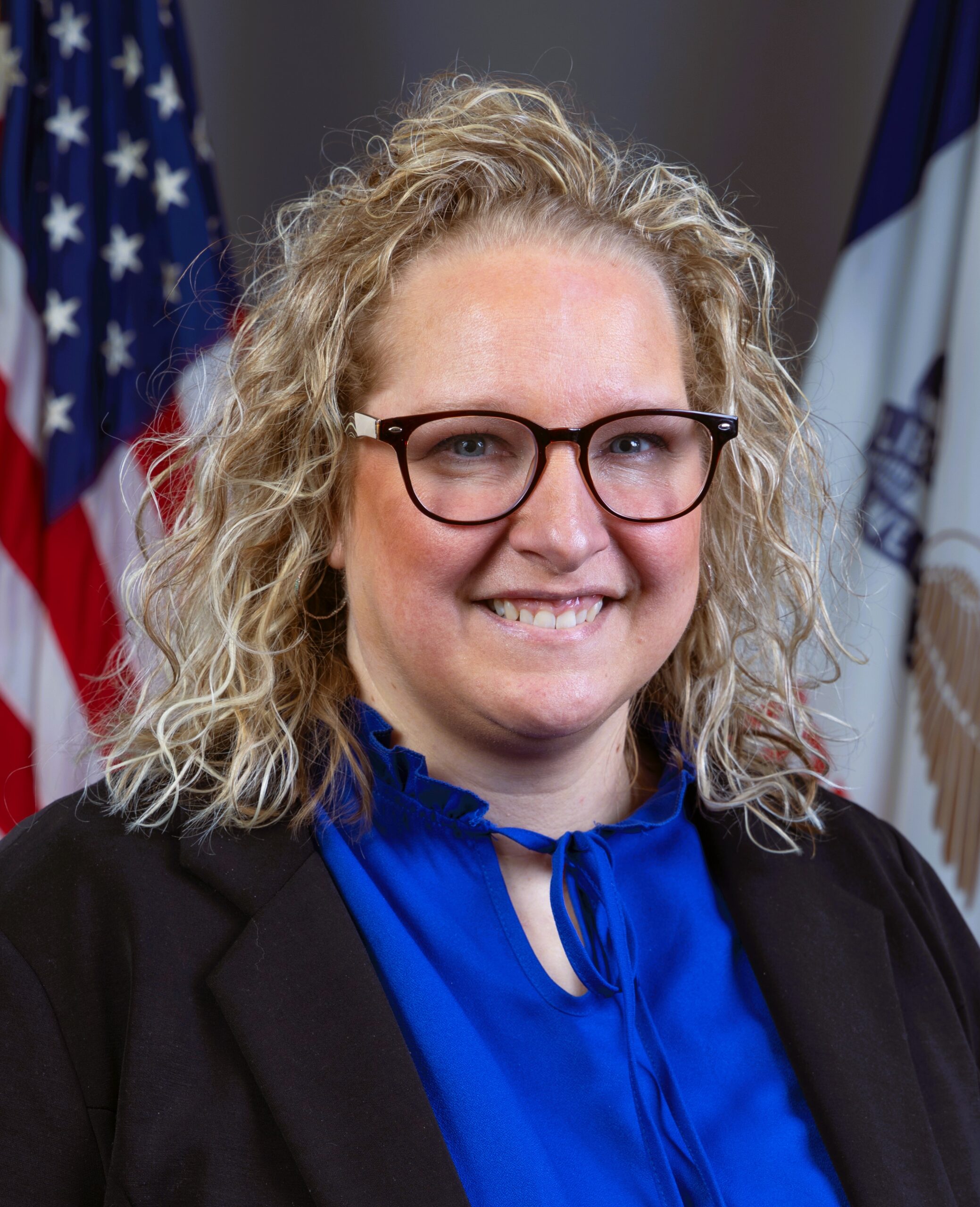
Monica Garner, M.Ed.
Monica Garner is an experienced educator with over twenty years working in Early Childhood as a practitioner and administrator. Monica serves as the Iowa Head Start State Collaboration Office Director and facilitates connections and partnerships between Head Start agencies and state/local entities.
Sean Clark
Sean Clark began his public health career in May 2022 as a Compliance Officer with the Lead Professional Certification Program at the Department of Public Health. After gaining a year of experience in environmental health, he earned his Lead Inspector license. Following the program’s transition to the newly established Department of Inspections, Appeals, and Licensing (DIAL), Sean’s role expanded to include grant management, outreach, and enforcement activities. His work continues to support and strengthen lead safety and environmental health initiatives across the state.
Continuing Education Credits
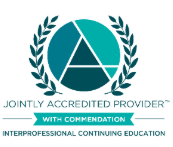
Accreditation Statements
In support of improving patient care, this activity has been planned and implemented by the University of Iowa Roy J. and Lucille A. Carver College of Medicine, Institute for Public Health Practice, Research and Policy, and Iowa Department of Health and Human Services. The University of Iowa Roy J. and Lucille A. Carver College of Medicine is jointly accredited by the Accreditation Council for Continuing Medical Education (ACCME), the Accreditation Council for Pharmacy Education (ACPE), and the American Nurses Credentialing Center (ANCC), to provide continuing education for the healthcare team.
Nurse: The University of Iowa Roy J. and Lucille A. Carver College of Medicine designates this activity for a maximum of 6.25 ANCC contact hours.
Physician: The University of Iowa Roy J. and Lucille A. Carver College of Medicine designates this live activity for a maximum of 6.25 AMA PRA Category 1 Credit(s)™. Physicians should claim only the credit commensurate with the extent of their participation in the activity.
Other Health Care Providers: A certificate of participation will be available after successful completion of the course. (It is the responsibility of licensees to determine if this continuing education activity meets the requirements of their professional licensure board.)
Abstract Submission – CLOSED
Abstracts to be accepted should highlight the importance of collaboration in your work that pertains to lead poisoning prevention information, outreach, and services. Successful abstracts should also address the successes and and challenges faced by programs and partners in addressing childhood lead poisonings in Iowa.
Abstracts will be categorized according to one of the two primary session topic areas and at a minimum address one of the following:
Clinical
- Blood lead testing
- Clinical case management
- Lead poisoning prevention education & outreach
- Coordination & collaboration of childhood lead services
- Health care provider outreach and education initiatives
- Outreach to populations disproportionately at risk of lead poisoning
Environmental
- Sources of lead exposure
- Environmental investigation and case management
- Lead remediation funding and rehab projects
- Lead and housing policy initiatives
- Lead certification
Abstracts must include the following sections:
- Presenter information: headshot, title, credentials, and biography
- Introduction
- Learning objectives
- Statement of purpose
- Brief description of your approach
- Concise description / summary of strengths, challenges and outcomes,
- Conclusion
**Disclaimer: If selected to present this description will be used in the event program.
Abstracts should be uploaded as a word document or PDF.
Abstracts submission will close April 15, 2025.
Submit Your Abstract Here – CLOSED
If submitting an abstract for a joint presentation, all presenters must complete the abstract form. For joint presentation abstract submissions, please indicate the primary contact.